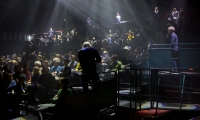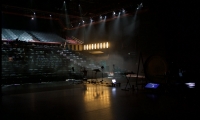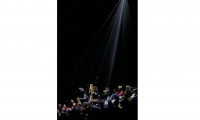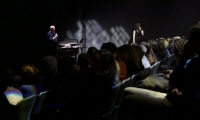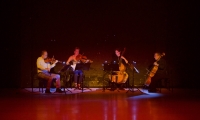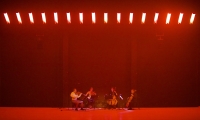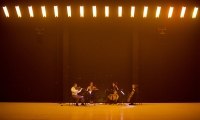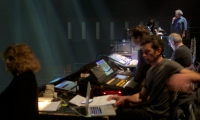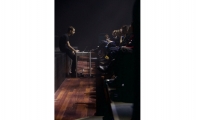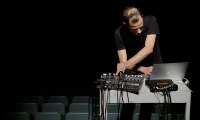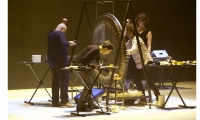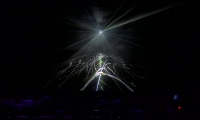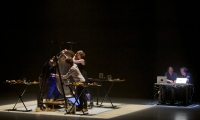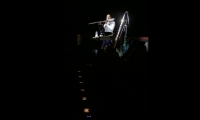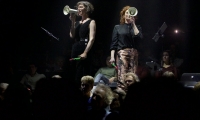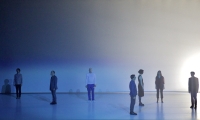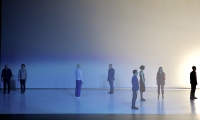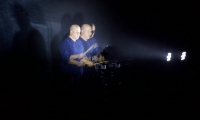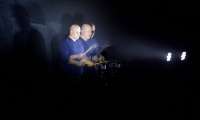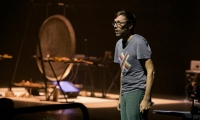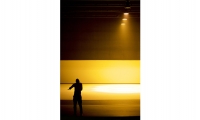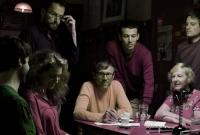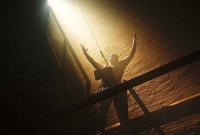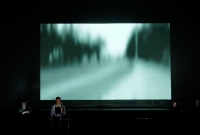All pictures: Herman Sorgeloos
Brussels, Kaaitheater, 18 December 2019
(Guy Gypens has been director of the Kaaitheater from 2007 from 2019).
Dear friends of Ictus,
A few days ago, when I wanted to start writing this speech I had a look at the Ictus website for some information and inspiration. Well, what is there to add to what I found? The Ictus website is without any doubt the most comprehensive artistic website I know. If you want to experience 25 years of Ictus lock yourself up in a space with good WIFI for a week or two and look, listen and read. You’ll have the most fantastic recordings of the most important contemporary composers at hand. You’ll have videos of concerts and performances. There is a list of every concert they ever performed, framed by a clear timeline and biography. There’s even an explanation of where the name Ictus comes from and what it means.
So, what is there to add? Maybe that the explanation of the meaning of the word Ictus is not necessarily complete. It is of course the point in a pattern of beats that articulates the pulse of the music. But if you look beyond music theory you’ll find that Ictus also means heartbeat, and more precisely the heartbeat that you can hear when you put a microphone to your chest. But, it also means stroke, as in CVA, a cerebrovascular accident. It is, in other words, ambiguous: it can be positive – pulse, heartbeat – or it can be negative – stroke, wound.
It is interesting to consider that ambiguous meaning for several reasons.
Let us first of all look back at 1994, the year Ictus was founded. What a year that was: a year of extremes. On the one hand it was a year of hope: Nelson Mandela became the first black president of South Africa; Yasser Arafat, Yitzhek Rabin and Shimon Perez received the Nobel Peace Price. On the other hand it was also a year of total despair. In the Rwandese genocide between 500.000 and one million people lost their lives. In 1994 the world started to realise the real consequences of the end of the Cold War. The initial euphoria – it was the end of history, remember – was warily questioned because of more and more examples of deep destabilisation. It would take at least 15 more years before the frivolous behaviour of the victors would really come to an end, but in 1994 the more lucid amongst us, artists for instance, began to realise that the un-ambiguous claim of post-Cold-War-capitalism was more treacherous than it was beneficial.
Let’s look at the music scene in 1994. Please forgive me for going back to my own life-story for a moment and therefore going back in history even more. I grew up in the seventies, the ultimate decade of ambiguity. The oil crisis put a stop to the economic utopia of the Trente Glorieuse and the moral utopia of the sixties’ emancipatory hippy movements was replaced by the dystopia of the no-future punk scene. The seventies and the early eighties were one long moment of delightful hesitation as far as the Arts were concerned: do we still participate in the quest for a better world or not? From 79 until 83 I worked in a bar in Diest. The bar was the ultimate symbol for the hippy-punk duality. Upstairs it still looked like the hippy place it had been since the mid-sixties, downstairs, in the basement, it was a notorious punk shelter. I worked in the basement. The solution for the dilemma came, as it always seems to, from economics. The neo-liberal message was simple: you don’t need to believe in anything anymore, just trust and participate in the market. It was the ultimate act of de-politicisation: convincing people that your ideology is not an ideology, that it is objective, just a matter of proper calculation. No ambiguity necessary anymore!! Winning the Cold War was providing the perfect pretext for installing total belief in that radical capitalist approach. And the music scene was eager to follow. I apologise to my friends from the music business for what I’m about to say. Commercialisation, frivolous je m’en foutisme, became the ruling principles of the music scene. Not just in popular music, also in the classical realm. The deregulating power of neo-liberalism was embraced by a large part of the music industry. Of course this happened also in other art disciplines. But in music it persisted surprisingly long. Whilst in the performing and visual arts, movements of re-politicisation had already begun in the mid nineties, in music they happened only fairly recently. Even RAP-music lost itself in commercial bullshitting once the nineties were underway.
But there were exceptions of course. And I admit, there were lots of exceptions. Generalisations like the ones I just made are only acceptable for the sake of argument. And that is where Ictus comes in. When I read the interview in Bruzz with Tom Pauwels and Jean-Luc Plouvier, it struck me that, in their relating of the Ictus history, ambiguity stood out like a fil rouge: hesitation between contemporary and experimental, between music and dramaturgy, between sacralisation and de-sacralisation, between sound and phrases, and so on. Maybe the founders of Ictus didn’t realise it at the time, but the principles upon which the ensemble was built were a clear statement against the dogmatic, commercial, post-Cold-War, neo-liberal, post-historic and more and more post-democratic world around them. It was not just the inspiring artistic ambiguity they embraced or the experimentality as mode of existence they chose for, it was also, and maybe even primarily, the organisational form the ensemble took that made them different. It had to become, from the very beginning, a collective of musicians, not an ensemble under the direction of a chef or a composer. And although Lukas called himself director of Ictus, democratic decision making was always at the core of the Ictus practice. With all the issues and disillusionment that democracy carries with it of course. And the organisational mode changed over the years, but up until today, Ictus remains an ensemble of musicians. Like their contemporaries in theatre, Tg Stan, Maatschappij Discordia and quite a number of others, Ictus took on the challenge of becoming a concrete and mental space for the emancipation of the musician, a decision making, co-creating, thinking musician. Not a short-sighted, specialised executer of scores, but a careful developer of meaning. Not a careless consumer, but a caring citizen: rejoicing and drowning in ambiguity.
When I came to Brussels in 1987 I did so because of music. So much of what I liked at the time, whether it was the minimal music of Rosas danst Rosas and Maximalist! or punk and experimental new wave, was made by artists working and living in Brussels. I wanted to be there too. Ictus was the confirmation that I made the right choice. And they still are until today. My twelve years in this house were more about theatre and dance than about music but if I had to make a top five of my best evenings in all those years at least five of them would involve Ictus:
- Liquid Room: as a concept
- Liquid Room IV / A History of Synchronicity: with Xavier Leroy in it
- Liquid Room VII / Sound & Vision: with Ula Sickle in it
- The Michael Gordon/ Mauro Lanza evening: with the audience on stage.
- The Wayward / Harry Partch: it doesn’t get much better than that
- A Steve Reich Evening: by Rosas
- American Lament: in collaboration with Liesa Van der Aa in the Kaaistudio’s
- Safe: in collaboration with Julie Pfleiderer also in the Kaaistudio’s
- This is not a popsong
- Vortex Temporum
- Einstein on the Beach
And that is only to name five!
This had to be a laudatio for a 25th anniversary.
So to end: They are good, they are very good.
Guy Gypens
December 18th, 2019, one hour before the Pneuma concert at Kaaitheater
Link: Ictus at Kaaitheater, a synoptic view
